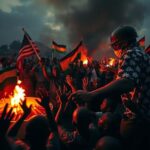Conflicts
AFRICA, ARMED FORCES, BELL, CHAD, CHRISTIAN LOMBANA MONCAYO, CIVIL WAR, CRISIS, FOREIGN MINISTRY, GUSTAVO PETRO, HEMEDTI, LIBYA, LO, LOMBANA MONCAYO, MIGRATION, MOHAMED HAMDAN DAGALO, OMAR AL - BASHIR, RAPID SUPPORT FORCES, REFUGEE CRISIS, REFUGEES, SAF, SUDAN, SUDANESE ARMED FORCES, UAE
Sophia Klein
Colombian Ex-Soldiers and Their Role in Sudan’s Civil Conflict
A troubling investigation reveals that over one hundred Colombian ex-soldiers have been recruited to join the Rapid Support Forces (RSF) in Sudan, reportedly under false pretenses. Colombian President Gustavo Petro seeks measures for their return. The fate of Christian Lombana Moncayo, a missing Colombian, remains uncertain, with reports of his identification documents surfacing following an alleged ambush by Sudanese Armed Forces (SAF).
Recent investigations uncover a troubling trend, as it has been reported that over one hundred Colombian ex-soldiers have been recruited to participate in Sudan’s ongoing civil conflict, fighting alongside the Rapid Support Forces (RSF). Colombian President Gustavo Petro is urging the Foreign Ministry to explore avenues for repatriating these individuals, who are believed to have been misled about their ultimate destination before being transported via Libya. Circumstances surrounding the fate of Christian Lombana Moncayo, a missing Colombian, have drawn particular attention due to the emergence of his identity documents after a reported ambush involving SAF forces in the border area between Libya, Chad, and Sudan.
The conflict in Sudan stems from a power struggle between two factions—the Sudanese Armed Forces (SAF) and the RSF—emerging from a civilian uprising that ousted former dictator Omar al-Bashir. This civil war presents a significant humanitarian crisis and has positioned Libya as a transit hub for mercenaries entering the fray. The mystery surrounding Lombana Moncayo’s fate remains unresolved, creating urgent questions regarding the motivations behind recruiting Colombian nationals to fight abroad and how their identities ended up in the context of violent conflict. Bellingcat has utilized geolocation analyses alongside social media activity to retrace the steps of Lombana Moncayo, suggesting he traveled from Colombia to the UAE before potentially ending up in Libya and onward to Sudan.
In reviewing the series of events leading to his disappearance, Bellingcat has established a timeline that illustrates Lombana Moncayo’s journey, marked by individual testimonials from former soldiers recruited under dubious pretenses. The recent geolocation of a TikTok video, shared days prior to the ambush, indicates that he was in southwest Libya and supports claims of Colombian nationals traveling through this terrain towards their uncertain fates in Sudan. The intersection of misrepresentation, exploitation, and the violent realities of international conflict beckons further scrutiny, demanding accountability for those facilitating the recruitment and transportation of vulnerable individuals into geopolitical crises.
Concisely, this investigation not only highlights the fate of Colombian mercenaries caught in a foreign conflict but also the broader implications of foreign intervention in Sudan’s civil strife. The geopolitical factors at play—including the involvement of external powers—complicate matters, bringing to light the intricate web of motives behind recruitment practices.
The recruitment of Colombian ex-soldiers for participation in foreign conflicts, particularly in Sudan, raises critical ethical and geopolitical concerns. The civil war in Sudan, fueled by historical and current political tensions, has attracted mercenaries, including those from Colombia, who may be misled about their involvement and ultimate destination. The identification of these recruits and their international transit routes, particularly through Libya, underscores the complex dynamics of warfare in contemporary contexts, where individuals from various nations become embroiled in conflicts far from home due to misleading representations and promises of opportunity or adventure.
In summary, the situation surrounding Colombian mercenaries purportedly recruited for combat in Sudan embodies the complexities of modern warfare and human vulnerability. The ongoing investigation into the fate of individuals like Christian Lombana Moncayo sheds light on the exploitative practices involved in their recruitment and the dire consequences of misled intentions. As the conflict in Sudan continues to evolve, understanding the networks that facilitate such recruitment will be crucial for preventing future occurrences and safeguarding the rights of those affected.
Original Source: www.bellingcat.com








Post Comment